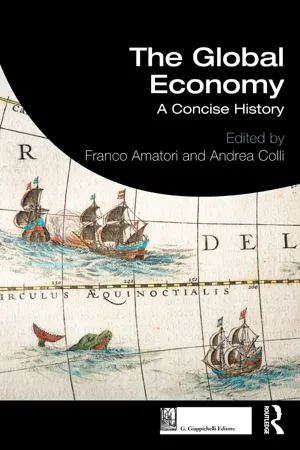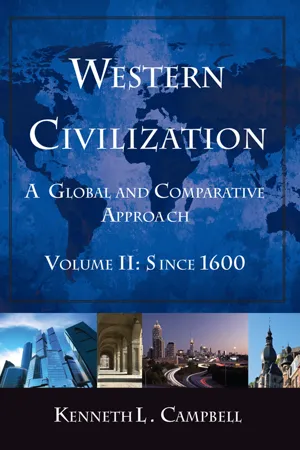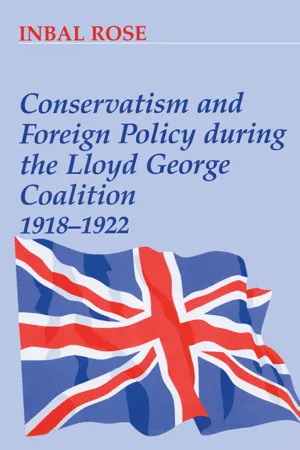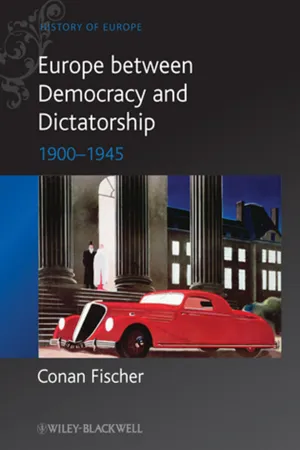History
End of WW1
The end of World War I, also known as the Great War, occurred on November 11, 1918, with the signing of the Armistice. This marked the cessation of hostilities between the Allied powers and Germany. The Treaty of Versailles, signed in 1919, formally ended the state of war and imposed significant penalties and territorial changes on Germany.
Written by Perlego with AI-assistance
Related key terms
7 Key excerpts on "End of WW1"
- eBook - ePub
The Global Economy
A Concise History
- Franco Amatori, Andrea Colli(Authors)
- 2019(Publication Date)
- Routledge(Publisher)
THE GREAT WAR: THE END OF A WORLDSUMMARY : 10.1. Interpretation of the war: discontinuity and social revolution. – 10.2. Total war: industrial planning and mobilization. – 10.3. The geopolitical and economic consequences . – Bibliography.10.1. Interpretation of the war: discontinuity and social revolution
The First World War ended a period of peace and progress that had lasted almost uninterrupted since 1870. The conflict weakened Europe, which lost its political and economic supremacy for good, and it also shaped world geopolitics until 1989. International trade was seriously damaged, and the international monetary system ceased regulating the relations between currencies.The First World War was defined as “great” not just because of the numbers of countries or troops involved, the scale of destruction and death it caused or the duration of the conflict itself, but also because it was revolutionary and levelling, cutting across all social classes. It was a kind of incubator for the transformations that were to occur in the 20th century. The war modified politics, society, culture and the economy, marking the end of positivism and liberal individualism. It led to the development of a new collectivist concept of the state, which guaranteed new rights for its citizens, redefining and reshaping the relations between political power and capitalism. The state broadened its prerogatives of intervention, vigilance and control, not only in economic affairs but also in social issues. In the period between the two wars, the state also implemented population and public health policies, entering into the most private spheres of individual and family life to compensate for the generation gap caused by the loss of so many young people in war.The 1919 constitution of the Weimar Republic was written immediately after Germany’s defeat, and was an ideal representation of the classless society born in the trenches. It was the archetype of an original conception of the national community, providing an ideal model for the new 20th century democracies. It enshrined a new concept of the citizen-state relationship, making the state responsible for satisfying citizens’ essential needs (work, education and health). It redesigned the connections between collective and individual rights and exalted the dignity of intellectual and manual work. It revolutionised the relations between capital and labour, income and profit, income and labour, to the benefit of the community. - eBook - ePub
Western Civilization: A Global and Comparative Approach
Volume II: Since 1600
- Kenneth L. Campbell(Author)
- 2015(Publication Date)
- Routledge(Publisher)
9 The Aftermath of World War I, 1919–1929 World War I had a dramatic impact on the culture and society of the postwar decade. Changes in almost every area of life provided a sense that a new era had begun and that the world would never be the same. For many people, the war gave way to a period of uncertainty, anxiety, and questioning of traditional customs and values. The war damaged people’s faith in progress, reason, and democracy. The British author and war veteran Robert Graves titled his 1929 autobiography and war memoir Good-bye to All That, referring to the life and world he had known before the war. Some older certainties had given way to a sense of crisis, confusion, and helplessness, if not of impending doom. At the end of 1918 Europe was economically devastated, physically exhausted, and psychologically demoralized. For other people, however, the new age meant new possibilities and the excitement of modernity. The changes that Europe experienced in the 1920s turned out to be an extension of changes that had already begun during the war itself. The war had served as a solvent of class distinctions and gender barriers, accelerating the transition to a society that would radically differ from that of even the late nineteenth century. In addition, European politics were revolutionized by a war that had called for so much sacrifice from the masses. No less important was the peace settlement that ended the war, which redrew the map of Europe and affected the fate of millions. The war changed the relationship between Europe and the rest of the world as well - Inbal Rose(Author)
- 2014(Publication Date)
- Routledge(Publisher)
Introduction: The End of the WarThe First World War, ‘enormously bigger than any other war’, had left in its wake physical devastation, political chaos and emotional suffering on an unprecedented scale.1 No European country had escaped. France, though victorious, faced a shattered economy and a ruined countryside. Defeated, exhausted and in political turmoil Germany had withdrawn into its borders. The Russian Empire, torn by revolution, appeared on the verge of disintegration. And the Austro-Hungarian Empire had fallen apart while the Ottoman Empire had finally collapsed, their place taken by a succession of small, energetic and squabbling states. The war had reduced Europe to its ‘original atoms’.2In 1918 the victorious powers were faced with the daunting task of rehabilitating Europe. Political boundaries had to be defined, nationalistic controversies defused, economic life reconstructed and internal political disorder calmed. In addition, the pre-war balance of power had now become a thing of the past. ‘Deep shifts of power had occurred’, and ‘the old diplomatic importance of Berlin, Petrograd, Vienna and Constantinople could not be maintained’.3 This meant that new diplomatic relationships and codes of behaviour, indeed an entire international system, had to be established. Thus, although the task of rebuilding Europe was one of multiple dimensions and gargantuan proportions, it was also a challenge which held out untold opportunities. The peacemakers had to devise a settlement which would not only bring about peace, but which would shape and re-mould the nature of international relations.Britain, as one of the two leading Allied Powers, was directly confronted with this challenge. In November 1918 Europe was undergoing continuous evolution, and there was the possibility of further, greater and more permanent change. The feeling was that ‘a whole world was visibly passing away before our eyes’, and the danger was recognized that unless such spontaneous, often impulsive changes be given some form and direction from above, ‘a setback [might] be given to Europe from which she will not recover for generations’.4 Europe required a new political framework and Britain was faced with the task of creating one expeditiously yet cautiously It was a task, as Churchill put it, of ‘great responsibilities’.5- eBook - ePub
War, Peace and International Relations
An introduction to strategic history
- Colin S. Gray(Author)
- 2013(Publication Date)
- Routledge(Publisher)
Reparations: Germany agreed to make financial reparation to the victors for the non-military damage that its war-making had effected. The amount to be paid and a fixed time schedule for payment were not part of the settlement.It would be difficult to exaggerate the impact of World War I upon the course of twentieth-century history, so the more significant of the war's consequences need to be cited.- Disarmament: Germany was effectively disarmed (though it was able to cheat systematically on its obligations). Also, the victors committed themselves to their own disarmament, at least in principle.
- New states: In accordance with the principle of national self-determination, the geopolitics of Eastern Europe were transformed from a condition of domination by three rival empires – the Austrian, Russian and Ottoman – into one characterized by an array of squabbling small states. Most importantly, Poland reappeared on the map for the first time since 1795, and the new multi-ethnic state of Czechoslovakia was created.
- The League of Nations: The League was founded to keep the peace. It was to do so through application of the principle of collective security. The whole collectivity of nations was supposed to combine to resist an aggressor.
- The Locarno Treaty of 1925: This final element in the post-war settlement registered the mutual acceptance of the Franco-German and Belgian–German frontiers, and guaranteed the integrity of those frontiers. Britain and Italy were the treaty's ‘guarantors’. Locarno marked Germany's re-entry into the community of nations. The treaty guaranteed frontiers only in Western Europe, not in the East.
Both international relations and the domestic functioning of societies were all but turned upside down. What became a total war, requiring belligerents to mobilize all of their assets of all kinds, had revolutionary, certainly far-reaching, implications for relations between classes, capital and labour, sexes, government and industry, and governments and the governed.Four empires were removed from the map: the Imperial German, the Austro- Hungarian, the Russian and the Ottoman. In place of being dominated by the shifting relations among Germany, Austria-Hungary and Russia, East–Central Europe was suddenly populated by an array of new, weak states. These states, especially Poland and Czechoslovakia, separated Germany from Russia. But they could not possibly serve a serious barrier function once Germany or Russia, or both, recovered from their low condition of the 1920s. - eBook - ePub
- John Mueller(Author)
- 2013(Publication Date)
- Cornell University Press(Publisher)
CHAPTER 3
WORLD WAR I AS A WATERSHED EVENT
European attitudes toward war changed profoundly at the time of World War I. There is no way to quantify this change except perhaps through a rough sort of content analysis. Before the First World War it was very easy, as documented in the previous chapter, to find serious writers, analysts, and politicians in Europe and the United States exalting war as desirable, inevitable, natural, progressive, and necessary. After the First World War, such pronouncements become extremely rare, although the excitement of the combat experience continued (and continues) to have its fascination to some.1This suggests that the appeal of war, both as a desirable exercise in itself and as a sensible method for resolving international disagreements, diminished markedly on that once war-racked continent. In an area in which war had been accepted as a standard and permanent fixture, the idea suddenly gained substantial currency that war there was no longer an inevitable or necessary fact of life and that major efforts should be made to abandon it.This change has often been noted by historians and political scientists. Arnold Toynbee points out that World War I marked the end of a “span of five thousand years during which war had been one of mankind’s master institutions.” In his study of wars since 1400, Evan Luard observes that “the First World War transformed traditional attitudes toward war. For the first time there was an almost universal sense that the deliberate launching of a war could now no longer be justified.” Bernard Brodie points out that “a basic historical change had taken place in the attitudes of the European (and American) peoples toward war.” Eric Hobsbawm concludes that “in 1914 the peoples of Europe, for however brief a moment, went lightheartedly to slaughter and to be slaughtered. After the First World War they never did so again.” And K. J. Holsti observes, “When it was all over, few remained to be convinced that such a war must never happen again.”2 - eBook - ePub
World War I
A Short History
- Tammy M. Proctor(Author)
- 2017(Publication Date)
- Wiley-Blackwell(Publisher)
This unique and relatively short example of civil war signals the fundamental change wrought in the geopolitical balance by three years of war and by the Russian Revolution. When considering how and why the war officially ended in 1918, these two factors play a crucial role. The nature of war and the revolutionary upheavals it spawned also help explain why, for many people, violence did not end with an armistice or even a peace treaty. As 1918 dawned, a series of important shifts had taken place in the nature of the war. First, Lenin’s Bolsheviks signed an armistice ending the fighting in the Russian Empire in December 1917, and they made plans for treaty negotiations in the spring. This removal of the Russian front from the war freed up a number of German units for service elsewhere and convinced Allied planners that new strategies needed to be pursued. Second, the entry of the United States into the war meant a boost in supply of almost everything for the Allies (food, munitions, soldiers), but the mobilization of the Americans was slow. Without a standing army of any size and with its distance from the battle, most American soldiers and goods could not arrive until sometime in 1918.Finally, war weariness was taking a toll on morale in every sector. Financing the war was difficult and rates of desertion had risen. In major cities, labor disputes and strikes rose in both quantity and severity, and serious problems with discipline and morale at many front‐line zones also worried officials. Most everyone involved in the war, from politicians to military planners assumed that 1918 would be decisive in some way. Everyone knew that it would be impossible to continue this war much longer without the complete destruction of the social fabric of the societies at war.In fact, it was clear to most observers that the war had become a race to achieve victory while supplies and a semblance of morale remained. As early as January 8, Woodrow Wilson delivered a speech to Congress laying out his vision of a postwar settlement. Known as the “Fourteen Points,” this series of principles excited the interest of many national and colonial liberation movements with its emphasis on the concept that populations in a state should have a voice in the creation of nations. Importantly, this speech was quite vague about whom might qualify for determining their own fates as nations, and it provided both hope and disappointment when the text was published in the international press. Major points included specific demands such as the creation of an independent Poland and broader ideological claims for self‐determination and a “League of Nations” as an international mediation force in the postwar world. Wilson doubled down on these ideas in subsequent speeches, including one in February where he explained self‐determination as a core ideal, noting that “every territorial settlement involved in this war must be made in the interest and for the benefit of the populations concerned.” - eBook - ePub
Europe between Democracy and Dictatorship
1900 - 1945
- Conan Fischer(Author)
- 2011(Publication Date)
- Wiley-Blackwell(Publisher)
78 Against such idealism, however, were set unrealistic expectations, territorial and economic greed, a thirst for revenge, and fear – of national bankruptcy, of revolution, and of further war.The victors, the Allied and Associated Powers, scarcely shared a common set of positive war aims and this was ultimately to prove fatal to the peace settlement. Aims and objectives frequently conflicted as promises made to lure one potential ally into the war violated undertakings to another, as the interests of a maritime power disregarded those of a continental state, or as those of a creditor state conflicted with those of its debtor allies. Even among the victors, the Paris Peace Conference was not a gathering of equals, with the Asiatic powers feeling slighted, even humiliated. Among the European powers only France and Britain were able forcefully to project their aspirations. The Soviet Union, heir to the defunct Russian Empire, was excluded from the conference altogether as the issue of Soviet representation became entangled with ill-informed Allied efforts to grapple with the challenges thrown up by the Bolshevik Revolution. Did it carry the threat of global revolutionary contagion, or was it little more than a transitory phase in the history of a profoundly unstable country? The presence of prerevolutionary Russian exiles in Paris, who claimed to speak for their homeland, complicated matters further, but in any case the French Premier Clemenceau remained bitterly opposed to any Soviet presence at the talks. Instead, he advocated the containment of the new Soviet state with the least possible effort and the minimum of expense.79
Learn about this page
Index pages curate the most relevant extracts from our library of academic textbooks. They’ve been created using an in-house natural language model (NLM), each adding context and meaning to key research topics.






